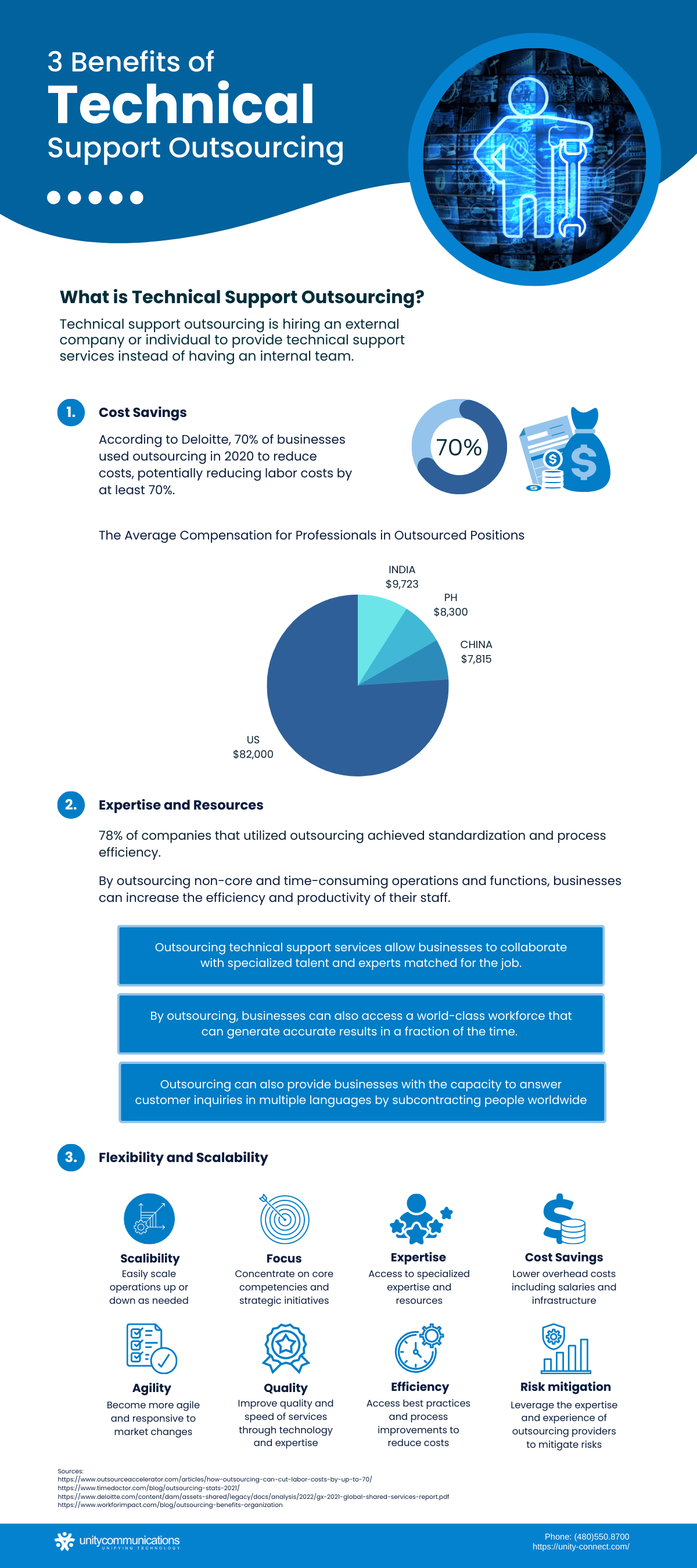Table of Contents
How do you choose the right technical support outsourcing provider for your business?
If you’re unsure, this blog post is for you.
Finding outsourced technical support isn’t a challenge. Search the web, and you’ll find tons of service providers. They’re a phone call or a click away. The challenging part is picking the best one to get your money’s worth. You wouldn’t want your first try to be costly, would you?
This article shows the vital elements to consider when outsourcing technical support.
Continue reading to learn more. Plus, check out our tips at the end.
Factors to Consider When Hiring a Technical Support Outsourcing Provider

An outsourced IT provider helps customers with questions and concerns about product or service use. It is also called a technical support company, third-party vendor, or business process outsourcing (BPO) company. A service provider assigns its client information technology (IT) tech support or help desk team.
The BPO industry abounds with thousands of IT support vendors worldwide. Outsourced tech support is a back-office outsourcing function generally accepted as an effective business practice to boost productivity and reduce costs. It is a major differentiator that makes you stand out in the competition and succeed.
Explore the three main factors to help acquire the best technical support outsourcing provider. These are services, prices and costs, and BPO companies. Let’s jump in.
Look for Services That Match Your Needs
Below are the four types of services to seek from a BPO provider.
1. International Coverage and Multichannel Support
Choose a BPO company that provides global coverage, omnichannel, and around-the-clock services.
Your customers must reach the outsourced tech support team regardless of location—on a mobile, at home, at an office, or elsewhere. They must also be able to contact the team at any time, even during the holidays, after business hours, and on weekends.
In addition, consumers need to use different communication platforms to suit their preferences. The more choices they have, the better. Ensure that the service provider has such channels as:
- Phones (fixed lines and mobile)
- Social media
- Live chat
- Chatbots
- Knowledge base resources
- Self-service portals
A global reach with multiple channels and 24/7 support enables your business to expand to new markets and establish an overseas presence. Here are 11 benefits of establishing an international operation.
- Stronger customer retention and loyalty lead to more repeat business
- Easier access to various technical talent to improve efficiency and productivity
- More potential customers for the brand to increase the consumer base
- Seamless customer interaction irrespective of time, device, and location
- Quicker technical assistance service without sacrificing quality
- Improved customer experience for greater satisfaction and trust
- Wider communication choices for customer convenience
- Enhanced quality of customer data and information gathered for keener insights
- Upgraded products or services due to more customer feedback
- More protection against weak local operations with a new market covering lost revenue
- Greater economies of scale resulting in lower operating expenses
2. Compliance-focused Service
Search for technical support outsourcing vendors that provide data security and compliance services. Failure to comply with government regulations and industry standards can lead to expensive fines, grave penalties, reputational harm, and potential imprisonment.
Federal authorities and industry watchdogs safeguard the public from online intruders, hackers, and criminals illegally accessing personal data. They ensure the enforcement of laws and guidelines.
Below are five laws and standards to comply with.
- Telemarketing and Consumer Fraud and Abuse Prevention Act. Federal law requires telemarketers to acquire a licensed certificate and legal permission to work. This act prevents telemarketing deception and malpractices.
- Health Insurance Portability and Accountability Act of 1996 (HIPAA). The federal regulation imposed on healthcare providers and practitioners protects patients’ health information from unauthorized release.
- International Organization for Standardization (ISO). The globally recognized independent entity with strict standards issues sought-after certification. An organization that meets its quality assurance needs receives an ISO certificate.
- General Data Protection Regulation (GDPR). The European Union regulation aims to protect consumer information. Companies with customers in the region must inform regulators about their data gathering.
- Payment Card Industry Data Security Standard (PCI DSS). The policy requires all businesses to secure credit card data to reduce credit card scams.
Quick tips to know whether a BPO firm handles compliance and security services:
- Check whether it has advanced software to secure vital information
- Obtain its detailed online security policies
- Find out whether it has a team of compliance or security specialists
3. Multilingual Help Desk Support
Choose a third-party vendor providing multilingual services to cater to the technical support needs of international buyers. Its IT team must speak a language in addition to English. Portuguese, German, Spanish, Chinese, or Nihongo (Japanese) are examples.
Not many BPO firms offer multilingual help desk support because bilingual talent is hard to find. But Non-English buyers and internet users worldwide are numerous, offering you bigger earning potential and a stronger business edge. They typically purchase and patronize products and services that deliver information and after-sales help in their native language.
To get the right multilingual customer support service, here are some pointers to note.
- Check whether the service provider has reliable translation software. The BPO firm must publish information in different languages. It must have accurate auto-translation tools to instantly convert text into the customer’s local tongue.
- Browse the BPO provider’s website. Navigate its site and determine whether it’s possible to translate self-help options into several languages. Non-English customers must understand chatbots and frequently asked questions (FAQs).
- Examine the third-party vendor’s communication channels. Look into its social media, live chat, email, and knowledge base if they are multilingual-capable. These are effective channels when selling to your target overseas market.
- Know the BPO firm’s cultural expertise. Every country has different communication preferences. Japanese customers want to be addressed with their titles, while French buyers favor phone interaction.
4. Fast Response Time Service
When you outsource data entry, tech support, and other functions, choose a BPO firm with the capabilities to fulfill the tasks quickly. Response time refers to the average period in which the team addresses a user’s requests or concerns. The customer contacts the team via a phone call, email, social media, or chat. Fast response time means the BPO team is efficient and dependable.
The following are three advantages of fast response time.
- Higher customer loyalty. Delivering quick service (with accuracy and high quality) indicates how they care about consumer concerns. Loyalty will likely translate to more purchases from the same buyers.
- Enhanced brand image. Speedy service strengthens the brand’s reputation, giving it an edge over competitors. It also allows customers to quickly recognize your product or service and buy it the soonest.
- Word-of-mouth promotion. Customers satisfied by quick and efficient service tend to share the experience with others. They post it on their social media accounts, write positive reviews online, or send favorable comments on other websites.
To find the right BPO company with a fast initial response time, use the benchmarks below.
- For phone calls – a maximum wait time of three minutes is acceptable to most customers.
- For email – not exceeding four hours to reply to a request or concern is preferable.
- For social media – answering queries in less than five minutes is recommended.
- For live chat – responding in 45 seconds at the onset is considered excellent.
Ask the potential service provider for the latest metrics showing its tech support team’s performance speed.
Find Reasonable Pricing and Costs
Before partnering with a technical support company, consider three price and cost factors.
1. Different Pricing Models
Pick a BPO company that provides several pricing plans to get the best one for the outsourced IT support functions. Flexible pricing based on business conditions is an ideal option. It charges you more during brisk sales and lowers its fees in a downturn.
To make flexible pricing agreeable to the third-party vendor, provide details of the potential income and losses from the outsourced operations. Being transparent by giving relevant and accurate revenue data will likely make your partner accept the terms.
Below are the common pricing packages BPO companies offer to clients.
- Performance-based – depends on the production
- Fixed price – fixed charges periodically
- Per-user fixed fee – based on the number of users
- Per-device flat fee – based on the number of devices
- Transaction-based – transaction volume determines service rates
- Ad hoc fee – per project basis fee
- Monitoring only – payment for network maintenance
2. Cost-effective Outsourced Tech Support
Back-office outsourcing services reduce operating expenses. Delegating tech support tasks to a BPO firm is more cost-efficient than managing an in-house tech support team. Teams based in BPO-friendly countries with a skilled and affordable workforce handle most of these outsourced activities.
To get the most out of your outsourced venture, choose a BPO firm prepared to shoulder these costs to save you time, effort, money, and other resources:
- Recruitment. The BPO firm deals with talent scouting, initial reviewing, testing, interviewing, hiring, and training tech support personnel.
- Infrastructure. To run the outsourced processes, the service provider takes care of the facilities or the physical systems, including software, hardware, networking devices, and other necessary equipment.
Don’t forget to ask your prospective partner for documents showing their cost-reducing capabilities. Inquire in detail about how it plans to reduce your expenses.
3. Service Charge Transparency
Determine the total outsourcing costs at the start to give you enough time to prepare for the correct budget. To identify whether the technical support outsourcing provider’s fees are affordable, ask for a full list of its:
- Rates
- Charges
- Pricing packages
- Hidden fees
- Extra expenses
- Other cost-related data
Note that service providers offer various pricing plans. Its packages are based on factors, including the client’s particular needs, company size, and work or call requirements.
Not all BPO companies disclose extra charges at the onset. You might incur unexpected expenses along the way from work disruptions, extra-legal services, and employee termination.
Find the best price with these three steps.
- Check each prospect’s pricing scheme.
- Make a shortlist.
- Pick the one that best suits your budget and needs.
Identify Potential BPO Partners
Here are the three elements to look for in a BPO provider.
1. Excellent Reputation
Hire one that has an extensive track record proving it has worked with well-known companies. A service provider with a solid reputation is stable and reliable. Take these tips to know its standing in the industry and with the clients.
- Conduct ample research. Examine the BPO firm’s credentials and achievements by checking unbiased online reviews. One example is Clutch, an independent platform that gathers impartial client feedback about each business listed on its site.
- Contact the BPO prospect. Request the prospect’s latest key performance indicators (KPIs) and other metrics to gauge tech support performance, production, and efficiency. Look for the average first response time, resolution time, and customer retention rate.
Unity Communications, for instance, has earned global awards and collaborated with big companies in the U.S since 2009. It handles outsourced data entry services, accounting help desks, and customer service support.
2. Next-generation Technologies
Short-list a BPO provider that uses advanced systems and applications to streamline processes. New help desk platforms aid tech support specialists in managing large work and call volumes.
In addition, the latest platforms let the IT team handle customer concerns, complaints, and questions more efficiently by automating common tasks. Overseeing complicated issues and expediting service to improve consumer service and satisfaction become easy.
Check whether the service provider’s tech support team uses secure cloud-based solutions. The technology speeds up connectivity, collaboration, customer service, and information delivery. It unifies applications such as call center software, customer relationship management, and help desks. Achieve higher power and speed with this system.
Other technologies to look into are omnichannel communications, artificial intelligence (AI) and machine learning, multilingual and self-service support, and incident management software.
3. Specialized Team
Ensure that the technical support outsourcing provider has a dedicated group of specialists for the delegated IT tasks. Their primary responsibility is to offer a consistently excellent customer experience and satisfaction.
A specialized team comprises experienced, accurate, responsive, and empathetic individuals. Ask the BPO partner for permission to check the skills and backgrounds of team members. Each must have these seven qualities:
- Active listening skills
- Teamwork
- Help desk software experience
- Proficiency in standard operating systems
- Problem-solving skills
- Organization skills
- Above-average analytical skills
Verify from the BPO firm whether it provides a full staff of agents, engineers, consultants, and developers. A balanced team can successfully address technical concerns and requests. Entry-level specialists handle basic concerns such as installing software and troubleshooting. Meanwhile, complex ones, such as designing security applications, go to high-tiered agents.
Bonus Tips
Here are other helpful suggestions when recruiting a technical support outsourcing provider.
- Choose an outsourcing type. If you want lower operating costs, pick offshoring or nearshoring. If you’re after better collaboration, go for onshoring (local outsourcing).
- Pick the proper size. Search for a BPO firm that is roughly your size for service priority. If you’re a big organization with a large workload to outsource, hire a service provider with thousands of employees. If you’re a startup, get a small or medium-sized one.
- Set goals and business requirements first. Consult with other decision-makers and involved employees in your organization about outsourcing technical support. Discuss important topics, including team size, workloads, outsourcing types, and communication channels.
- Prefer a BPO company with technical certifications. A third-party vendor accredited or certified by a government agency, academe, or industry association is advisable. Credentials indicate professionalism and efficiency. Microsoft IT Support and HDI Customer Service Representative are some examples.
- Develop a request for proposal (RFP). To get as many BPO prospects as possible, draft this document containing the outsourcing requirements, including the budget, solutions, work scope, and time frame. Send it to various service providers. The RFP attracts many bidders to help you get the best third-party vendor.
The Bottom Line
If you’ve reached this part of the article, you should have gained knowledge of outsourced support functions and what to remember and do when looking for the ideal outsourcing partner.
Keep doing your homework, too. Outsourcing is a major decision with long-term results. Ensure you’re well-informed before committing to a third-party service provider ready to help with your back-end processes.
As a last tip: conduct a comparative cost study to determine whether outsourcing tech support functions or keeping an in-house team saves money, time, and effort.




